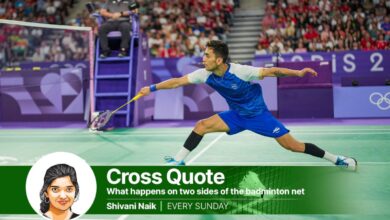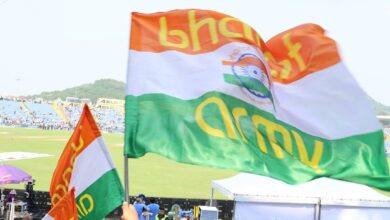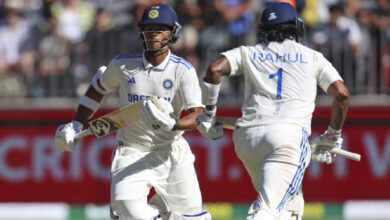Parents on the perimeter: Why young women shooters need their fathers and mothers at the pressure-soaked Olympic trials | Sport-others News

It’s almost 40 degrees but feels a lot higher. The sun is harsh; the breeze, hotter. Stand for a couple of minutes and you are reminded of that old animated ad where the sun sucks energy out of you with a straw.In this oven, Sumedha Bhaker is sitting on a roofless bench in the central lawns of Bhopal’s shooting range. She sits and endures, the light brown sunglasses her only protection.
Fifteen or so minutes later, she gets up in a huff and walks towards the 10m qualification hall. She reaches for the door but steps back, leans on the railing and begins typing furiously on her phone.
Overcome anxiety of a nervous parent, Sumedha can’t muster the courage to go inside, where the mercury is rising too. India’s top five pol shooters are having a proper go at each other. Their three-year-long Road to Paris has come down to a series of tense and intense selection trials. Only two of them will get on the plane to Paris. The difference between competing at the Olympics and sitting at home could be in decimals.
Manu Bhaker (right) with her mother Sumedha Bhaker. (Express Photo Mihir Vasavda)
It’s that close.
One of the shooters is Sumedha’s daughter, Manu. And the tension is too much for this former school principal to take. “Nahi dekha jaata mujhse,” she says. “I couldn’t bear to watch. The stress is too much.”
***
Indian shooting comes with a PG rating.
The youngest quota winner is only 16 years old. A bunch of them are in their late teens or early 20s and only one shooter who is competing at these trials is in his 30s.
At the firing points, these are all young monks with weapons. Stillness is their highly-rated virtue. Their skill is staying poker-faced and impassive in the face of immense pressure.
Behind them in the stands, their anxious parents tell another story. It’s a sea of emotions out there.
Azad Singh, the father of rifle shooter Nancy, is so stressed that he removes his mojris and starts pacing around the hall barefoot, muttering some mantras a guru taught him. The night before the qualifying round of the trials, he woke up abruptly at 3 am ‘because of tension’ and sat in the hotel’s garden till 6.30, when Nancy woke up.
Nandita Das, the mother of 16-year-old rifle shooter Tilotama, hides behind a wall when her daughter fires an ‘average’ series (a total of 10 shots make a series). Tilotama’s father, Sujit, doesn’t move an inch away from the screen that displays the score of each shot. He notes it on a WhatsApp chat with himself for future reference.
Father’s of Tilotama and Nancy, Sujit and Azad, talk after the selection trials. (Express Photo Mihir Vasavda)
Sachin Singh, the father of multiple Asian Games gold medall Esha, hoped to travel to Vaishnodevi last month to pray for his daughter’s smooth selection for the Olympics.
But his flight to Jammu witnessed such turbulence (“I thought for a second I’ll die,” he said) that it had to make an emergency landing in Amritsar. His Vaishnodevi plans derailed, Sachin spent the night sleeping on the seat next to the bus driver so that he could reach Delhi in time for the second selection trials. “Worst trip of my life. But it felt worth it since I was with Esha during the trial.”
It’s not a coincidence that only the parents of women shooters have accompanied them. “It’s a question of safety,” Joginder Singh Gulia, the father of quota-winning shooter Palak, says. “But not just that. We are also here to support them, be with them in this brutally testing period.”
They are a unique breed, these sporting parents. They juggle – or put on hold – their professions, sell their businesses, sacrifice their ambitions and mortgage their gold with just one hope.
“Someday, my daughter will win something at the Olympics. Not for money, I have enough resources of my own. But just for the pride,” Joginder says.
***
What parents say is ‘support’, the federation and coaches call ‘nuisance’.
Sachin Singh, father of Esha Singh, watches the qualifying match of the selection trials. (Express Photo Mihir Vasavda)
Unlike in many other sports where moms and dads of athletes are an integral part of their entourage – chess, tennis, badminton to name a few – the parents of shooters aren’t always welcome at the ranges.
The extent of the mrust and the fraught relationship between the parents of the shooters and the federation can be found in the National Rifle Association of India’s (NRAI’s) selection policy.
Point number 17 of the document has a ‘special advisory’ that reads as follows: “Parents are advised to leave the shooters in the care of the Team officials and coaches assigned NRAI during coaching camps/participation in international competitions.”
It doesn’t stop there. The parents are instructed not to enter the field of play (FOP) or stay in official hotels during international competitions. They are even barred from being ‘in the vicinity of their ward during travel/competition arenas/FOP’.
16-year-old Tilotama with her father Sujit, mom Nandita and seven-year-old brother Sreejan. (Express Photo Mihir Vasavda)
It ends with a warning in bold and capital: “PARENTS, PLEASE NOTE THAT YOU ARE BEING INFORMED THROUGH THIS PUBLIC DOCUMENT THAT YOUR WARD WILL BEAR THE CONSEQUENCES OF YOUR TRANSGRESSIONS.”
Every shooter aspiring to go to the Olympics has been made to sign an undertaking where all these points are reiterated.
The NRAI’s policy was drafted because of what was seen as ‘interference’ in a coach’s job, according to former national coach Deepali Deshpande. “They would jump from the stands and enter the field of play during camps,” Deepali, whose five shooters have won Olympics quotas, says.
Parental interference is seen as one of the reasons why India haven’t won a medal at the last two Olympics, after finishing on the podium at the Beijing and London Games.
The nature of the sport is such, Deepali says, that a shooter should be able to handle ‘90 per cent of the things without depending on anyone else, including the coach and the parents.’ That line between parenting and coaching is often transgressed, she adds.
Sachin Singh with Esha at the Bhopal Shooting range. (Express Photo Mihir Vasavda)
“At one camp, I had to tell the shooters that if your parents even sat in the stands, you go and sit with them and not shoot,” Deepali says. “What they would do is make videos of other shooters, circulate them, or say things that would affect performance. They are all kids, you cannot do this.
“Indira Gandhi apne mummy ko lekar parliament jaati thi kya? (Did Indira Gandhi go to the parliament with her mother?)”
***
These diktats haven’t deterred the moms and dads. When it comes to team selections, especially for the Olympics, the parents are leaving nothing to chance.
Pawandeep Samra, Asian Games gold medall Sift Kaur’s father, drove her 1,200 km from their home in Faridkot rather than taking a train or flight. In his mind, he was just being protective while also ensuring his daughter didn’t have to deal with the hassles of travelling on a flight with firearms.
Their roles extend beyond just dropping their wards at the gates of a shooting range.
Sujit, Tilotama’s father, works for a tech company in Bangalore but now doubles up as his 16-year-old daughter’s ‘coach’. He notes her every shot and later in the night, when Tilotama is asleep, feeds all the data into the computer and tries to make sense of her groupings – the collective pattern of shots on the target.
”The next morning, I sit with her and we discuss what can be improved,” Sujit says. “If there is something too technical, I seek the help of the national team coaches.”
But not all parents dive into the technical part of shooting. Most are there only to support and protect their child.
Joginder Singh, Palak’s father, says he likes to be within the eyesight of his daughter so that in case she gets tense, he can calm her down.
Joginder Singh with his daughter Palak at the Bhopal Shooting Range. (Express Photo Mihir Vasavda)
”I just look at him and I feel good,” says Palak, whose quota in the 10m air pol last month ensured India secured the maximum possible spots in rifle and pol events for the first time. “I don’t necessarily need him for technical interventions. His presence itself is good enough to motivate me.”
Joginder, who had multiple business interests, sold his factories in Gurgaon and exited from another venture to devote more time to Palak’s shooting ambitions.
He isn’t the only one to make such a sacrifice.
Sumedha, Manu’s mother, was a school principal until she gave up that post to be with her at tournaments. It wasn’t an instinctive decision.
“I started doing this only two years after Manu started competing,” Sumedha says. “She wanted me to travel but I couldn’t leave my school. Hazaar bachon ko chhod ke ek ke liye nahi kar sakti (I couldn’t leave 1,000 kids for one). It took me two years to forget my school and school children.”
Sumedha is a constant travel companion for Manu. But she is seldom seen inside the ranges for long stretches, especially during the ongoing trials.
On Thursday, during the third of the four trials, as the Tokyo Olympian makes a poor start to the qualification round of the 10m air pol event, Sumedha begins to scribble notes on her phone.
“I was just typing whatever came to my head. These weren’t coherent thoughts, just a stress buster in a way,” she says, taking deep breaths to control her anxiety.
When that isn’t enough to relieve the stress, she returns to the bench on the lawn and sits under the harsh sun, mumbling a prayer.
Minutes later, Manu emerges from the room behind her and sits beside her mother. She recovered from the poor start to top the qualification, a favourable outcome for her vis-a-vis the team selection.
No words are immediately spoken. The mother and daughter sit in silence. The harsh sun feeling nothing compared to a heated, draining match in the air-conditioned hall.







